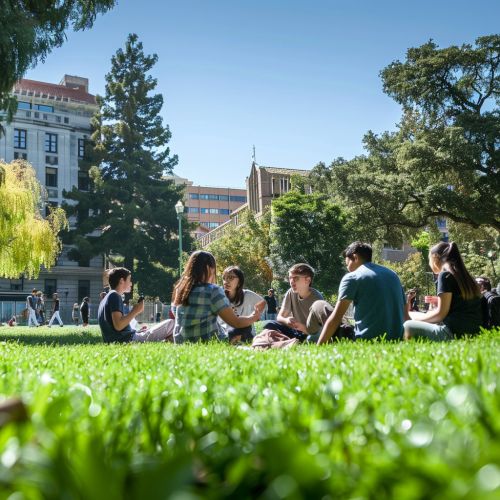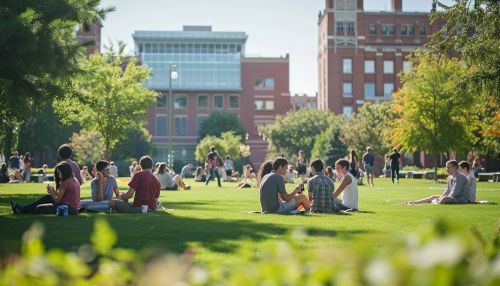Campus Life: Difference between revisions
(Created page with "== Introduction == Campus life encompasses the myriad experiences, activities, and social interactions that occur within a university or college setting. It is a multifaceted aspect of higher education that significantly influences students' academic and personal development. This article delves into the various dimensions of campus life, including academic environments, social activities, residential life, student organizations, and campus facilities. == Academic Envir...") |
No edit summary |
||
| Line 50: | Line 50: | ||
Student centers serve as the hub of campus life, providing spaces for socializing, studying, and participating in extracurricular activities. These centers often house student organization offices, meeting rooms, lounges, and recreational facilities. Student centers are designed to be inclusive and welcoming spaces that foster a sense of community. | Student centers serve as the hub of campus life, providing spaces for socializing, studying, and participating in extracurricular activities. These centers often house student organization offices, meeting rooms, lounges, and recreational facilities. Student centers are designed to be inclusive and welcoming spaces that foster a sense of community. | ||
[[Image:Detail-92147.jpg|thumb|center|Students socializing on a university campus lawn with buildings in the background.|class=only_on_mobile]] | |||
[[Image:Detail-92148.jpg|thumb|center|Students socializing on a university campus lawn with buildings in the background.|class=only_on_desktop]] | |||
== See Also == | == See Also == | ||
Latest revision as of 00:01, 18 June 2024
Introduction
Campus life encompasses the myriad experiences, activities, and social interactions that occur within a university or college setting. It is a multifaceted aspect of higher education that significantly influences students' academic and personal development. This article delves into the various dimensions of campus life, including academic environments, social activities, residential life, student organizations, and campus facilities.
Academic Environment
The academic environment is a cornerstone of campus life, providing students with the resources and opportunities necessary for intellectual growth. Universities and colleges offer a diverse array of academic disciplines, each with specialized curricula designed to equip students with knowledge and skills pertinent to their fields of study.
Classrooms and Lecture Halls
Classrooms and lecture halls are the primary venues for instructional activities. These spaces are equipped with modern educational technology, including projectors, interactive whiteboards, and audio-visual equipment, to facilitate effective teaching and learning. Lecture halls, in particular, are designed to accommodate large groups of students and are often used for introductory courses.
Libraries
Libraries are essential components of the academic environment, serving as repositories of knowledge and hubs for research. They house extensive collections of books, journals, and digital resources. Libraries also provide study spaces, research assistance, and access to specialized databases. The library catalog system allows students to locate and access materials efficiently.
Laboratories
For students in science, technology, engineering, and mathematics (STEM) fields, laboratories are crucial for hands-on learning and experimentation. These facilities are equipped with advanced instruments and tools necessary for conducting research and practical exercises. Laboratories foster a collaborative environment where students can work on projects and experiments under the guidance of faculty members.
Social Activities
Social activities play a vital role in enriching campus life by fostering a sense of community and belonging among students. These activities range from organized events to informal gatherings, providing opportunities for social interaction and personal growth.
Student Organizations
Student organizations are a fundamental aspect of social life on campus. These groups are formed around shared interests, including academic, cultural, recreational, and political activities. Participation in student organizations allows students to develop leadership skills, network with peers, and engage in community service. Examples include debate clubs, cultural associations, and sports teams.
Events and Festivals
Universities and colleges host a variety of events and festivals throughout the academic year. These events celebrate cultural diversity, academic achievements, and community spirit. Common events include homecoming, cultural festivals, and academic conferences. These gatherings provide opportunities for students to relax, socialize, and celebrate their accomplishments.
Recreational Activities
Recreational activities are essential for maintaining a balanced and healthy lifestyle. Campus recreation centers offer facilities for sports, fitness, and leisure activities. These centers typically include gyms, swimming pools, and sports courts. Intramural sports leagues and fitness classes are also popular among students.
Residential Life
Residential life is a significant component of campus life, offering students a unique living experience that promotes independence and community engagement. University housing options vary, including dormitories, apartments, and residential colleges.
Dormitories
Dormitories, or residence halls, are the most common form of student housing. They provide a communal living environment where students share rooms and common areas. Dormitories often have resident advisors (RAs) who assist with community building and provide support to residents. Living in a dormitory fosters close-knit relationships and a sense of camaraderie among students.
Apartments
Apartments offer a more independent living arrangement compared to dormitories. They are typically equipped with kitchens, living rooms, and private bedrooms. Apartments are suitable for upperclassmen or graduate students who prefer a quieter and more private living environment. University-owned apartments are often located on or near campus, providing convenient access to campus facilities.
Residential Colleges
Residential colleges combine academic and residential life by integrating living spaces with academic programming. These colleges have faculty members who live on-site and organize educational and social activities for residents. The residential college model promotes a holistic educational experience by fostering close interactions between students and faculty.
Campus Facilities
Campus facilities are integral to the overall student experience, providing essential services and amenities that support academic and personal development.
Dining Services
Dining services on campus offer a variety of meal options to accommodate diverse dietary preferences and needs. Dining halls, cafes, and food courts provide convenient and affordable dining options for students. Meal plans are often available, allowing students to prepay for meals and enjoy flexible dining options.
Health and Wellness Services
Health and wellness services are crucial for maintaining students' physical and mental well-being. Campus health centers offer medical services, including primary care, immunizations, and mental health counseling. Wellness programs, such as stress management workshops and fitness classes, promote healthy lifestyles and support students' overall well-being.
Student Centers
Student centers serve as the hub of campus life, providing spaces for socializing, studying, and participating in extracurricular activities. These centers often house student organization offices, meeting rooms, lounges, and recreational facilities. Student centers are designed to be inclusive and welcoming spaces that foster a sense of community.


